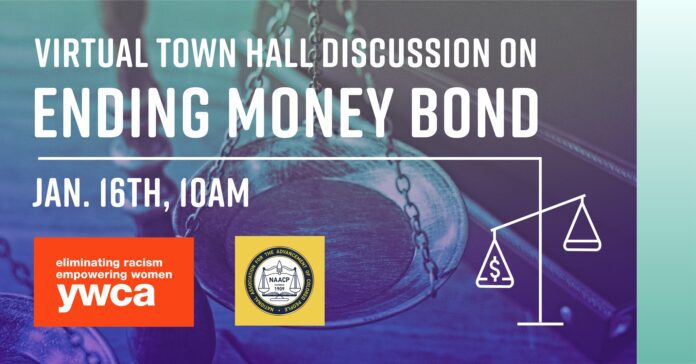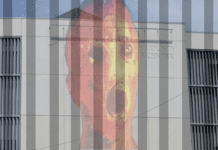Every year, more than 250,000 people are incarcerated BEFORE TRIAL in Illinois. Most are locked up simply because they cannot afford to post bail to secure their freedom. It’s as if our legal system is holding them for ransom.
Pretrial incarceration causes people to lose their jobs, homes, and even custody of their children. The immense harm caused by removing someone from their family, career, and community, simply because they do not have the financial means to afford their freedom, damages the individual and those who depend on their care, along with the social fabric that we all share, and their chances of a fair judicial process.
It is morally reprehensible that we lock up people before trial simply because they don’t have access to money. It is a complete disregard for the presumption of innocence until proven guilty. In communities throughout Illinois, people stuck behind bars are not there because they’ve been proven guilty of a crime, but because they cannot afford their money bond. That’s why over 100 organizations across the state have signed on in support of the Pretrial Fairness Act.
Fearmongers warn that without cash bail, dangerous criminals will roam free. “My fear is that if we went to a no bail system, we would have people out on the street recommitting crimes that should have stayed in custody,” said McLean County Sheriff Sandage. But those given a cash bail have been deemed by the court to not be a safety risk according to the law. The purpose of cash bail is to guarantee the defendant’s presence in court. If someone is a legitimate safety risk to themselves or others, a judge has the ability to remand them to custody until their trial.
Now, it is true that judges often choose to use very high bails to prevent allegedly dangerous defendant’s from being free. But, the logic behind this doesn’t really stand up to scrutiny. What exactly does someone’s ability to pay a bail have to do with their threat to the community? Derek Chauvin, Tuo Thao, Alexander Kueng, & Thomas Lane—the officers involved in the murder of George Floyd—were all given cash bails. They are currently free: Chauvin on $1 million bail and the rest on $750,000 bail. These former officers murdered someone in broad daylight surrounded by witnesses, they are international pariahs, and are knowledgeable in investigative practices, combat, firearms, and more. Yet, according to a judge, these individuals paying a ton of money negates these serious risks.
Look at the case of Kyle Rittenhouse, a 17-year old teenager that killed two protesters in the dead of night during protests in Kenosha, Wisconsin after the shooting of Jacob Blake by officers in the back. Rittenhouse was underage, past curfew, with a semi-automatic weapon. He fled the scene of the crime, crossed state lines into Illinois where him and his mother lived. When he was arrested and eventually extradited, he was given a $2 million bail. His bail was paid by right-wing supporters, and he was released into the custody of his own private security force and a retinue of extremist supporters convincing him he did nothing wrong. Do you feel safer with him out?
In McLean County Jail, there are several people accused of extremely serious violent crimes. Marshall Blanchard, who ran over protesters back in May with his motorcycle, has a bond of $40,000. Why is he not a safety risk if he can pay $40 grand? There are alleged sexual predators sitting in jail on dozens of sexual abuse charges, but some have bonds in the $150,000 range. Again, why would this person be less dangerous if they came up with this amount of money?
This isn’t to say the solution is to lock everyone up pretrial. It shows the flawed logic of high bails corresponding to dangerous people being locked up. This logic is deeply rooted in the long-standing belief that poverty is caused, not by economic & social conditions, but by the moral failings of the poor. From a capitalist perspective, people are poor not because of lack of resources, but a lack of work, of the supposed social threat of idleness. This belief actually finds its origins in late-medieval Christianity.
In the history of the United States, there is an additional strain of thought that contributes to the notions of the impoverished being immoral. Some of the first white settlers to what is now the United States were the pilgrims. The pilgrims were protestants that disagreed with the Church of England, leaving for the Netherlands before eventually setting up colonies in the Americas. Their religious beliefs were strongly Calvinist (a precursor of modern day Presbyterianism); and, believed that God had predetermined at the beginning of creation all events that would ever occur. This means humans did not have free will, and all the actions throughout their entire lives were decided by God long before they were ever born. For the Puritans, poverty was not a choice but something ordained by God, therefore God wanted you to be poor & miserable and someone else to be wealthy & less miserable. The Puritans thought who are we to question the will of god.
This combined with the existing beliefs of poverty by capitalists leads ones to almost fatalistic & profoundly paternalistic interpretations of poverty. The poors are poor because of moral turpitude, which seems to be caused by a neverending cycle of poverty that is difficult to break out of so the best we can do is lock people up. In his opposition to ending money bond, Sheriff Sandage said some of those cases involving drug suspects have ended tragically.

“Had they stayed in custody, we could have got them on the right track toward recovery possibly,” Sandage said. “They get out of custody, the first thing they want to do is get high again, and then we end up with overdose deaths.” In other words, only if we keep this person incapacitated in jail can we save them. Yet, there’s never any real discussion on what types of institutions needs to be created and invested with power to prevent people from ever having to be in jail in the first place.
Even allegedly woke police, like Peoria County Sheriff Brian Asbell, oppose abolishing cash bail. Asbell wrote in a Community Word OP-ED, “The jail has become a de facto behavioral health facility. Behavioral health includes both mental health and substance use, encompassing a continuum of prevention, intervention and treatment. I am in total agreement that the jail is not the ideal place to manage individual’s behavioral health needs, however, we have become the only available option due to the lack of community resources. The jail is the default answer for those who cannot follow the rules of society due to a mental illness and often related, co-occurring disorders.”

Why has the jail become the de facto behavioral health facility? Because of 40 years of neo-liberal austerity which has defunded mental health in our communities. The money was funneled into mass incarceration, and the solution will not come from more incarceration.
Law enforcement opposition to abolishing cash bail, whether for concerns over safety or mental health, are underpinned by a stronger concern: profit. Charging people a ransom to get out of jail generates wealth for the Sheriff’s departments. Bail is used to pay for a variety of things: court services, public defender, restitution, but some of it is kept by the jail. Even if a person’s charges are eventually dropped or they are found not guilty, jail’s never give back all the money to people; there’s always a fee, that a person pays for the “privilege” of being locked up when they weren’t guilty of an offense.
The inability for people to pay a cash bail also benefits Sheriffs. Each day an inmate stays in jail is a sum of money going towards their departments. In Peoria County, it costs about $130 per person per night; in McLean County it’s as high as $200 per person per night. [Editor’s note: This information is incorrect, and Agitation Rising retracts it entirely. The actual cost of an incarcerated person per day at the McLean County Detention Facility is $75.] Sheriff’s have a vested interest in keeping the jail as full as possible. Every fiscal year when the County has to allocate its budget, the Sheriff can stand there claiming that because the jail is full, they need more money. It is the reason Sandage, Asbell, and so many other sheriffs across Illinois have vehemently opposed efforts to abolish cash bail. It’s a revenue source: plain & simple.
Finally, neo-liberalism has brought additional ways of extracting profit from human misery. McLean County has outsourced communication services to a private corporation, Inmate Communications Solutions (ICS) Advanced Technology, who charge exorbitant prices to poor individuals who already can’t afford a bond payment. Currently, it costs $7.50 for a thirty minute video visitation and .25¢ per minute for phone calls. The contract between IC Solutions & McLean County guarantees the County 72% commission on phone call revenues, and 50% commission on all video calls. This means: the more inmates in the jail, the higher communication revenue becomes. Of course, part of the charges gets funneled to the jail budget.
While Sheriffs & Counties are profiting off of human misery, people languish in jail for months or years while they await their day in court. According to the Brennan Center, “Research finds that those jailed pretrial are four times more likely to be sentenced to prison compared to those released before trial. Jailed defendants are quicker to plead guilty after experiencing horrific conditions. They therefore often decide to plead guilty to a lower charge and accept fewer years behind bars rather than roll the dice at trial on a higher charge carrying more time — even if they could win in court.”
It is goes against the fundamental principles of the constitution that innocent people are being forced to plead guilty to crimes they did not commit merely because of accusations made by the state.
There is a solution, one that replaces money bail, with pre-trial services. The Pretrial Services Act, currently being considered in the Illinois Legislature, abolishes the money bail scheme along with all the profitization that comes from defendants that can’t pay their ransom. The Pretrial Services Act instructs judges to prioritize decarceration over incarceration, unless the defendant is a legitimate threat to a specific, identifiable person or is a substantial flight risks.
Furthermore, the act states,
With the COVID-19 global pandemic, law enforcement agencies across the country have decreased the amount of people who are incarcerated after an arrest by giving them summons to appear in court to address their alleged crimes. The pandemic has shown us that incarceration is not essential, especially for low-level offenses. The Pretrial Fairness Act actually gives police officers more discretion in who is incarcerated and who is merely given a summons after an arrest. Typically, police departments incarcerate everyone for every offense accept for non-criminal municipal & traffic violations. The Pretrial Fairness Act would encourage the practice of releasing individuals after an arrest and issuing a summons for most crimes. If the arresting officer doesn’t believe the arrested individual is a danger to themselves or others, the officer can decide to release the individual. At the same time, if the officer believes the individual is a threat, they can still incarcerate that individual, and a judge will decide whether to release the individual pending trial.
This act does not just abolish money bail, it also replaces it with pretrial services. These services include court reminders, check-ins, drug tests, and assisting people with transportation. Should someone unintentionally miss a court date, the Pretrial Fairness Act also reforms the warrant process. Currently, a judge must issue a warrant for immediate arrest. If the Act passes, the individual will be notified and given the chance to appear voluntarily, avoiding unnecessary arrests and saving valuable court & jail resources.
Finally, the Pretrial Fairness Act mandates that counties report pretrial information to the state so the data is transparent. Currently, individual counties are allowed to decide what information they want to keep and what they don’t making it difficult to approach pretrial issues empirically and reducing accountability to the public. The Act changes this.
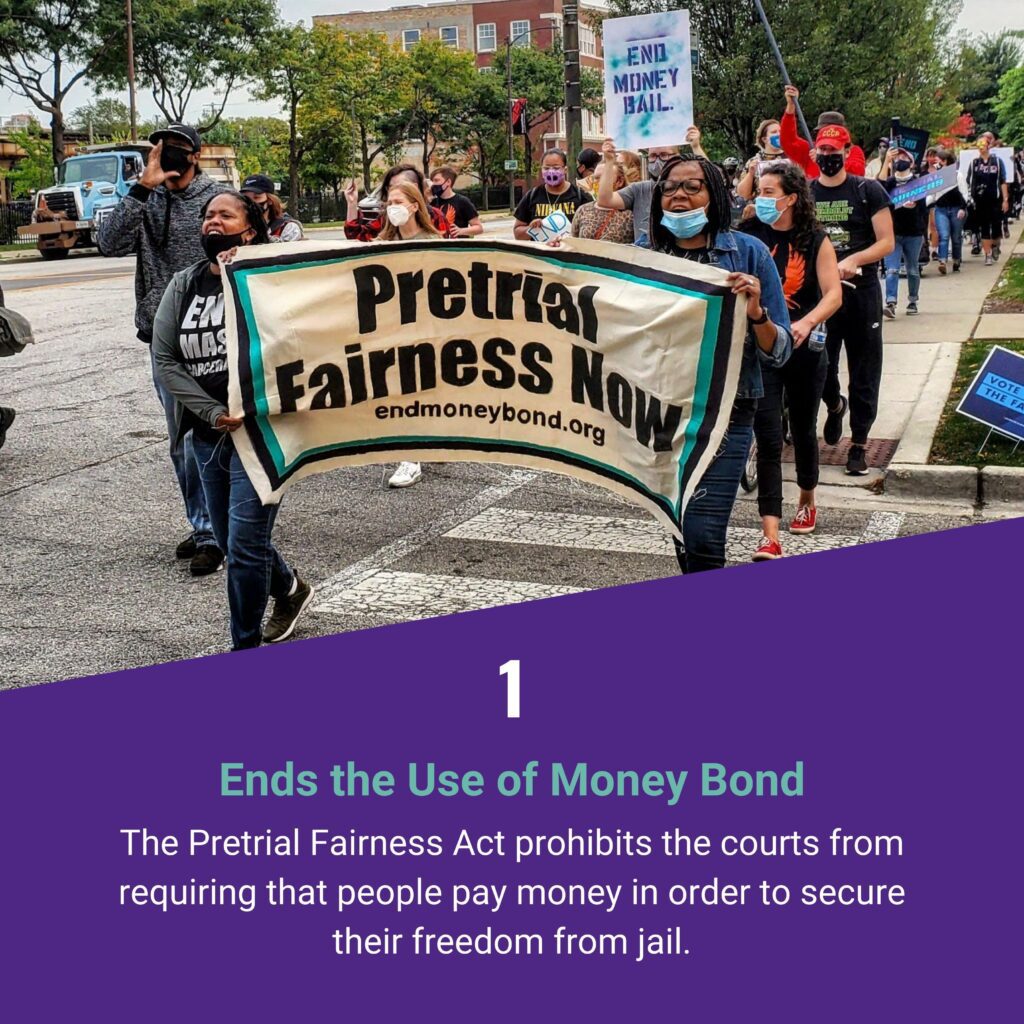




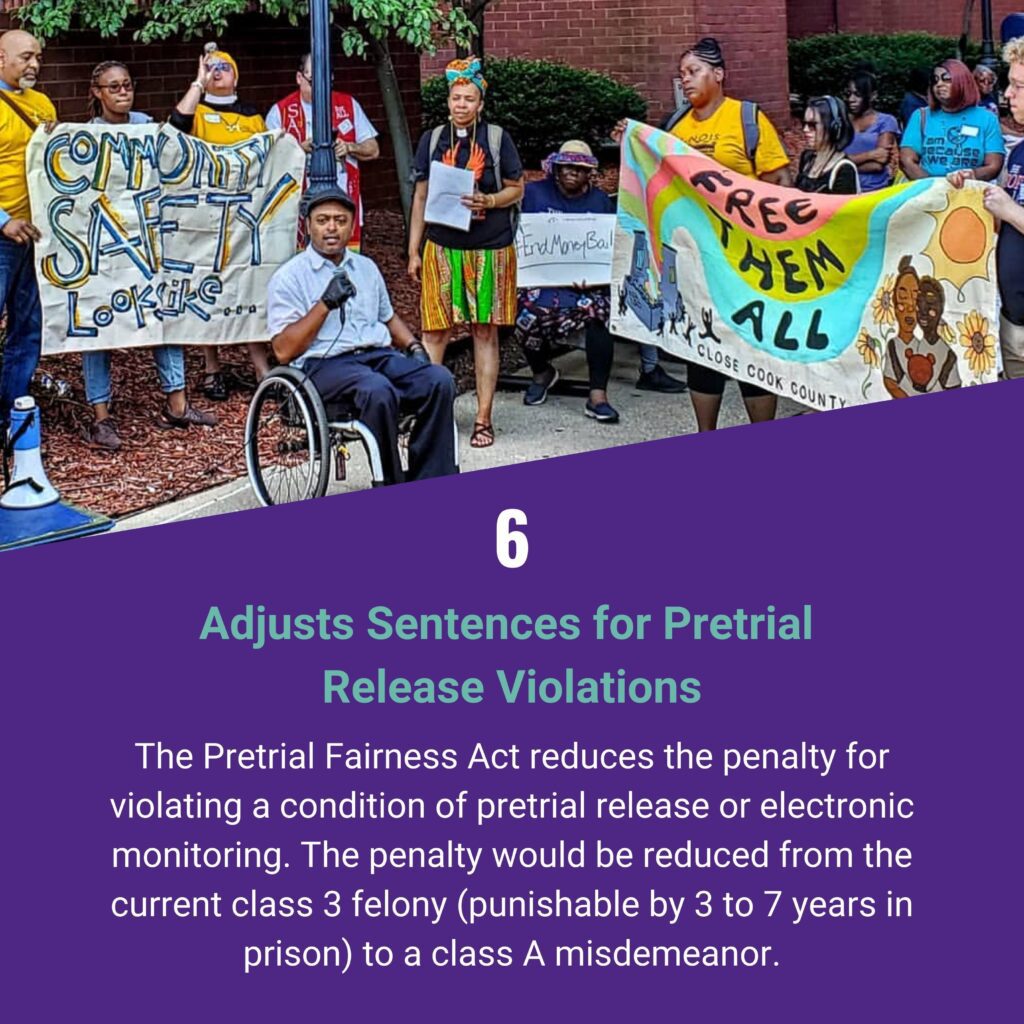
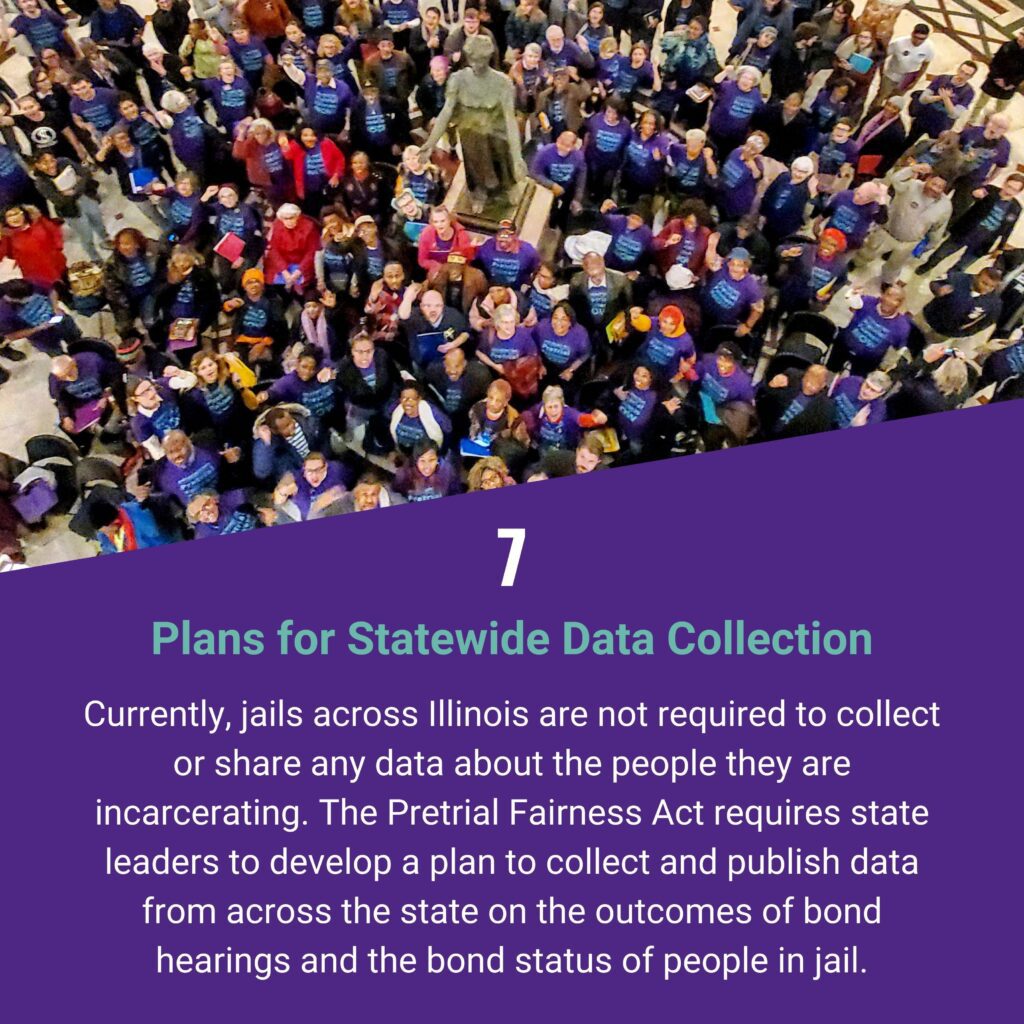

Anyone interested in learning more about the Pretrial Fairness Act or how to join the fight to end money bail, should check out this Virtual Townhall scheduled for Saturday, January 16th, 2021. The virtual town hall will inform our community on the progress being made to end wealth based pretrial detention.
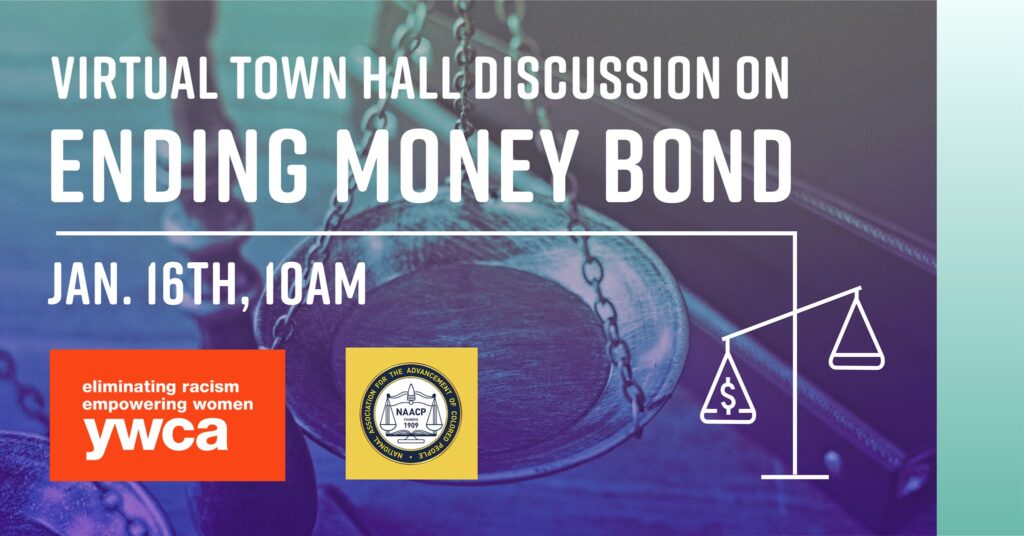
Join them in learning more about pretrial detention, the Pretrial Fairness Act, and what you can do to help end the unjust practice of money bond in Illinois.
REGISTER HERE: https://zoom.us/…/tJMrdO-orD8tEtZVjvyX2WqM0PcHSkofEwoz
Prior registration is required for this event. After registering, you will receive a confirmation email containing information about joining the meeting.
Facebook event: https://www.facebook.com/events/131217402026127
Co-hosted by:
Wayman AME Church
Unitarian Universalist Church of Bloomington Normal
Bloomington-Normal Chapter of NAACP
Bloomington-Normal League of Women Voters
Coalition to End Money Bond
Black Lives Matter Bloomington-Normal
Bloomington-Normal Democratic Socialists of America
YWCA McLean County
Activists have a real chance of getting this act passed within the next year.1 Both the Governor & Lt. Governor have come out in support of ending money bond.The decision of whether to keep someone in jail while they await trial should be based on their risk to public safety, not on how much money they have. We should not keep people in jail because they are poor, and we should not allow dangerous people to buy their way out.
Virtual Town Hall: Discussion on Ending Money Bail
This article was originally published on Strangecornersofthought.com and has been updated.
- Activists got this & more passed within days of this article, because People Power is the supreme power.


